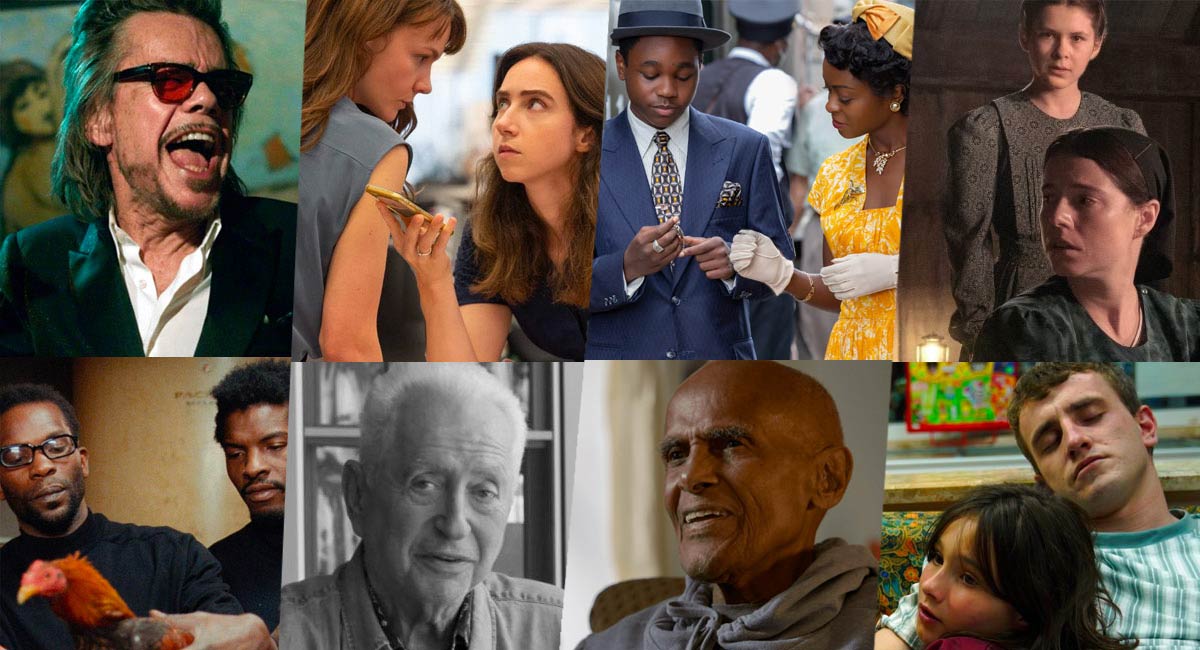(ThyBlackMan.com) Families come in all sizes and shapes. Immediate, extended, separated and crazy too. These films, from the 60th annual New York Film Festival, showcased how loving, eccentric or dysfunctional familial relations can be.
Aftersun (**1/2) Calum (Paul Mescal, Normal People), a divorced Scottish father living in England, reunites with his 11-year-old daughter Sophie (Francesca Corio). They meet up on a weekend trip at a Turkish resort they’ve frequented for years. It’s a winsome setup, and initially the lead actors make the parent/child reunion seem everyday-ish and endearing. Then they seem lost. A traditional script would take the twosome out of their comfort zone by adding in an evil antagonist, unexpected danger, a new romance, a natural catastrophe… Something off the beaten path. Instead, writer/director Charlotte Wells) lets them glide.
Dad and daughter share a hotel room, reminisce, reacclimate and enjoy their precious time alone. Calum: “You know you can talk to me about anything. Boys you meet, drugs you take.” Occasionally Sophie wanders off, and you fear for her safety. Sometimes he’s forlorn, and you worry. But nothing leads to a striking or memorable climax as the little bit of drama on view runs out of gas. Scenes with the grownup Sophie, recollecting moments with her father, winsomely ties the past and present together. But it’s not enough to plug up this film’s hole.
Aftersun works better as a travelogue and scrapbook. An introspective memento that may remind viewers of the nostalgic times they had with their own parents. While others may scratch their heads and wonder: “Why…? One character says: “I think it’s nice that we share the same sky.” That’s a nice thought but not profound, just like this mildly charming memoir.
Armageddon Time (**) Boys will be boys. In 1980 Queens, NY, Paul (Banks Repeta), a Jewish sixth grader at Public School 173, can’t get his head out of the clouds. He’s so lost in his dreams of becoming an artist his inattentiveness effects his schoolwork. He’s friends with Johnny (Jaylin Webb, Till), a black kid, who’s been bussed into the mostly white school. Paul has a stable family life, courtesy of his PTA President mother (Anne Hathaway), hardworking blue-collar, engineer dad (Jeremy Strong, HBO’s Succession) and doting grandfather (Anthony Hopkins).
The bio-ish narrative mirrors writer/director James Gray’s (The Yards) childhood. The intimacy of this immigrant family feels real and personal—like you’re sitting at their kitchen table as they discuss the Holocaust, a good education’s value, the American Dream and how to blend into the mainstream. That specific but often universal depiction of family life and Strong’s solid emotional performance are the film’s strengths.
The film’s weaknesses are the wishy-washy, irresponsible protagonist Paul, who lacks the backbone audiences crave. Also, the Johnny character is a negative stereotype that perpetuates some white parent’s worst fears about Black kids: disruptive, disrespectful, academically challenged, thieves, bad influences… Mother: “You’re not to associate with him again.”
Cliché racism, even in a well-intentioned, Regan-era film contemplating social ills, is still racism. And when Johnny forgives Paul for bailing on him, you know the character is merely a figment, because in real life he wouldn’t. A great family portrait that’s trying to be socially relevant but is painfully unaware.

Bones and All (**) Vampires might be easier to stomach, while people eaters require a certain taste. Maren (Taylor Russell) is not like the other teens at her high school. She likes to chomp down on flesh and devour people. She lives a rogue life going from town to town, encountering others like her—an extended family. There’s Sully (Mark Rylance) an older feeder, Lee (Timothée Chalamet) a young man she’s sweet on and others. The Golden Rule? “Never eat an eater.”
Fans of Oscar®-nominated director Luca Guadagnino (Call Me by Your Name) may be surprised by his decision to bring Camille DeAngelis’ cannibalistic novel to the screen. They may be even more shocked that the filmmaker has made a slow-moving dirge that will make die hard horror fans yawn and leave art film loversfeeling disappointed. This film should have been campy fun (Buffy the Vampire Slayer), pop culture teen bait (Twilight) or so dark it boggled the mind (Cronos). But no.
The snail-like pacing (editor Marco Costa) is a hinderance. Feeble storytelling zaps energy (screenwriter David Kajganich). Even the gorgeous visuals typical of Guadagnino films are only fleeting (cinematographer Arseni Khachatuuran). Russell is photogenic, Chalamet has become his own caricature and Reliance’s performance is way too theatrical. In between bites of tepid drama little happens, and you worry that this dull ode to trendy cannibals could turn audiences into zombies.
White Noise (**) Writer/director Noah Baumbach’s thoroughly compelling Marriage Story explored the perils of divorce and mesmerized audiences, even if their own marriages were intact. Surprisingly, his take on Don DeLillo’s satirical 1985 novel White Noise goes in the opposite direction. It’s off-putting.
A Hitler Studies professor (Adam Driver), his quirky wife (Greta Gerwig) and their four kids hit the road after toxic fumes threaten their suburban town. Their life vacillates between bewildering family com/dra, a dire evacuation, and bewildering family com/dra. Any hint of realism or purpose is missing.
Preposterous moments, sardonic rapid-fire dialogue and the very peculiar familial dynamics should make audiences laugh. Instead expect smirks, grimaces and a lack of enthusiasm. The cast, acting from a weak script, looks like they’re grappling for tone and clarity. Tech aspects are unremarkable—except the big cloud. Odd but not odd enough. It flails and flails for a butt-numbing 2h 16m.
For more information about the New York Film Festival go to: https://www.filmlinc.org/nyff2021/
Written by Dwight Brown
Visit NNPA News Wire Film Critic Dwight Brown at DwightBrownInk.com.
















Leave a Reply